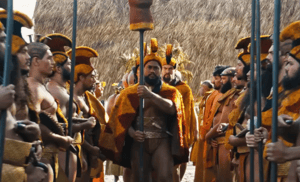Public Interest Journalism funded through NZ On Air
Tongan filmmakers Alice Lolohea and Vea Mafile’o showcase their latest work on the eagerly anticipated season 9 of Loading Docs – a launch pad for New Zealand documentary shorts.
The initiative provides local documentary makers with a platform to promote their creativity and talent and to create work that inspires and pushes boundaries.
Making her directorial debut with her documentary Testimony, Alice Lolohea documents a harrowing account of Tesimoni Fuavao whose parents were wrongly imprisoned for being overstayers and shares what really happened to them during the Dawn Raids.
She recalls being inspired and overcome with emotion listening to Tesimoni, who came forward to share his experiences at the historical Abuse in Care Inquiry in July last year.
“I remember watching him…and I could really just imagine all the people of his generation who had been through that same experience of being Dawn Raided,” Alice remembers.
“The grief and the trauma that they all had to live with and how that trauma must have manifested for them in different ways. It was one of the things that compelled me to the story.” Film director Vea Mafile’o, one of the creators behind the hit feature film documentary, ‘For My Father’s Kingdom, adds producer to her list of credentials for her role in Beneath the Surface.
The story follows the journey of Paralympic swimming champion Tupou Neiufi, who battles self-doubt and setbacks in her quest for Commonwealth Games gold. The documentary explores Tupou’s journey after a traumatic childhood accident at the age of two that left her with a permanent disability.
Vea says being able to share Tupou’s story was a privilege to highlight the challenges she has dealt with and continues to deal with, given the brain injury she sustained, “when you work with someone like Tupou you are inspired because we know life has its challenges for all of us,” Vea says.
“But when you are faced with the challenges Tupou has faced, how extra hard would that be?…it makes you feel grateful for the things and the privileges that you do have. You just can’t take things for granted.”
With both stories highlighting people of Tongan descent, Vea and Alice were well aware of the added responsibility they had not only as filmmakers, but also to tell the story with a Pacific lens.
“From a cultural perspective I always try to make sure that at the forefront of my mind, [Tupou’s] story will come across in a respectful way,” says Vea.
Competitive swimming requires athletes to wear swimming suits, whereas Pacific culture encourages girls and women to cover up and not to show too much skin, something which Tupou speaks about in the film.
“There would be a bit of talk as to – she should wear a t-shirt when she swims…but it’s kind of like, well that’s not gonna get me a gold medal,” Tupou laughs.
Vea adds that she loves that Tupou is a swimmer, because for many of our Pacific girls they shy away from the pool as they get older, and her story raises awareness about what it means in the context of body positivity image and how that can sometimes be in conflict with Pacific culture.
As for Tesimoni’s story, his entire testimony was spoken in Tongan. The language became an important focus for Alice, who worked alongside her cultural advisor John Pulu to get things right.
Alice says, “I think with any language when you translate into English you sometimes lose the mana behind the words.”
There were a lot of emotive phrases or words that he was using that I felt weren’t translated in a way that really hit how he was feeling. I wanted to try and draw that out for the documentary.”
And while the film is primarily a story of a Tongan family, she says all Pacific people can relate to it.
“I didn’t quite see this as just a Tongan story. It was a shared experience amongst many Pacific communities so I felt that responsibility there as well.”
Alongside producer Sandra Kailahi, Alice said the team understood that bringing a story of the Dawn Raids was one that had to be handled with sensitivity.
“It’s important we re-tell these stories to ensure that it doesn’t happen again. This is part of New Zealand history and a lot of the times as a country of course we celebrate our wins, but we need to acknowledge our past wrongs as well.”
With her first short film in the bag, Alice says she is inspired by the people who’ve come before her.
Alice says, “how lucky am I that in this day and age, there’s a lot of Pacific female filmmakers who’ve paved the way for people like me?”
Of the few that I’ve met and worked with, I’ve received nothing but encouragement and support and I want to be able to do that for the next generation of filmmakers.”
And for Vea, she’s pleased to see more female filmmakers entering within the industry and hopes the work they are doing with PISA (Pacific Island Screen Artists) will encourage more film makers, producers, writers and directors to come together to tell more stories of the people of the Moana.
“We need more of our female filmmakers out there and behind the camera because that’s the lens that we need our stories to come through. We need to have a brown perspective because that’s what’s going to resonate with our audience.”












